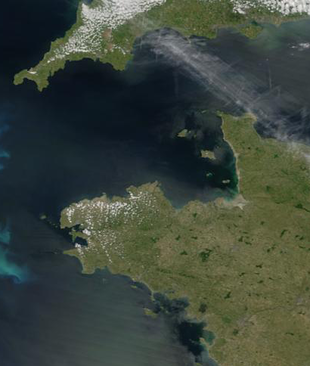Portal:Breton
| Quality resource: this resource is a featured learning resource. |
|
Kevrenn ar Brezhoneg
The Department of Breton Donemat e kevrenn ar Yezhoù Predenek war Wikiversity • Rann ar greizenn evit deskiñ yezhoù estren e Skol ar Yezhoù hag al Lennegezh
Welcome to the Breton Language Department at Wikiversity • Part of the Center for Foreign Language Learning of the School of Universal Language and Literature
Brezhoneg The Breton Language This is Brittany Ar brezhoneg zo ur yezh predenek eus skourr ar yezhoù keltiek komzet en darn vrasañ eus Enez Vreizh abaoe an Henamzer betek an aloubadegoù saoz. Tost-tre eo d'ar c'herneveureg (Cornwall:Kernow) ha d'ar c'hembraeg (Wales:Cymru) ha nebeutoc'h d'ar yezhoù keltiek all a zo bev c'hoazh, da lavaret eo ar skourr gouezelek : skoseg, gouezeleg ha manaveg (Scotland, Ireland, Isle of Man). Breton is a Brythonic language belonging to the branch of Celtic spoken over most of Britain from prehistoric times until the Saxon invasions. It is closely related to Cornish (Cornwall:Kernow) and Welsh (Wales:Cymru) and more distantly to the other surviving Celtic languages, Irish, Scottish Gaelic and Manx Gaelic (Ireland, Scotland, Isle of Man) (The Goidelic group). Diaes eo lavarout da vat pegoulz e voe ganet ar brezhoneg. Ken abred hag ar VIvet kantved e oa diazezet da vat ar vroadelezh nevez a Vreizh Vihan, hogen e-pad meur a gantved c'hoazh e chomas he yezh peuzheñvel ouzh hini Breizh-Veur - peurheñvel, zoken, ouzh ar rannyezh a gendalc'hed da gomz er Mervent.
An VIIIvet kantved eo ar maen-bonn a verk ganedigezh ar brezhoneg, ar c'herneveureg hag ar c'hembraeg evel yezhoù distag. Bet eo komzet ar brezhoneg gant pennoù-bras Stad Breizh betek an XIIvet kantved ha da c'houde ez eo bet dilezet ganto. Deuet eo tamm-ha-tamm da vezañ yezh Goueled Breizh hag ar bobl vunut p'eo bet dilezet d'e dro gant an noblañs hag ar vourc'hizien aet war ar galleg. Tamm-ha-tamm ez eo bet strishaet implij ar brezhoneg da Vreizh-Izel (er c'hornôg d'ul linenn hag a ya dre vras hiziv an deiz eus Plouha da c'hourenez Rewiz). Kroget ez eus bet da zeskiñ galleg d'an holl dud e Bro-C'hall ha da waskañ war un dro an holl yezhoù all a veze graet patois anezho en un doare dismegañsus. E Breizh peurgetket, a-drugarez da zoareoù kriz ez eus bet lakaet mezh war bugale er skolioù-Stad pe gatolik. Dalc'het e voe d'ar politikerezh-se da lazhañ ar brezhoneg betek ar bloavezhioù 1960, da lavaret eo betek ar mare ma voe echuet well-wazh gant ar skolioù da zegemer bugale dic'hallek desavet e brezhoneg gant o zud. Hiziv an deiz ha pa gendalc'hfe ar politikerezh gall da lakaat galleg dre-holl abalamour m'eo "yezh ar Republik" e vez komzet brezhoneg gant e-tro 300 000 a dud c'hoazh, e-skoaz 1 300 000 er bloaz 1930. Ar brezhoneg eo ar yezh keltiek nemeti hep tamm statud ofisiel ebet. It is difficult to tell precisely when the Breton language was born. As early as the sixth century the new country was established and known as "Lesser Britain", but for many centuries its language remained close to the one of Great Britain - very close even to the dialect spoken in the South West. The eighth century is the milestone where Breton, Cornish and Welsh are considered as different languages. The Breton language remained spoken by the heads of the Breton state until the twelfth century when they abandoned it. Little by little, it became the language of the west-end of Brittany and of the low class of the society as noble and "bourgeois" people left it in favor of the French language. Progressively, its usage was restricted to the part of Brittany which is now called Breizh-Izel (Low Brittany) (to the west of a line running from Plouha in the north down to the Rhuys Peninsula in the south). It was then decided to start teaching the French language to all people in France in order to get rid of all other pre-existing languages - dubbed scornfully patois. This was very successful in Brittany, thanks to a method designed to shame children speaking breton at school (state or catholic). This action to kill the Breton language continued until the year 1960 when the schools no more received children speaking only Breton. Today, as the French linguistic position is still to only put forward the french language considered as the language of the Republic, the Breton language remains spoken by circa 300,000 persons (to be compared with the 1,300,000 persons in 1930). This number will probably drop under 100,000 because the largest part of its speakers are of an older generation. The Breton language is the only Celtic language without official recognition. |
|
Here is the List of Staff members in the Brythonic Celtic Languages Division. TeachingIf you want to teach , please sign up at the Breton stream and contact the Head of Breton. Department news
|
LearningTo show your interest in the Breton Language, sign up at the Breton stream. This will provide a record of who is learning Breton, so you can see who else out there speaks Breton and can speak to them. Resources
It is helpful if the student is familiar with basic grammatical terms; should you need some clues, please follow these links to Wikipedia: Gwelout ivez / See alsoKentelioù / CoursesCurrent lessons
Planned lessons
|

